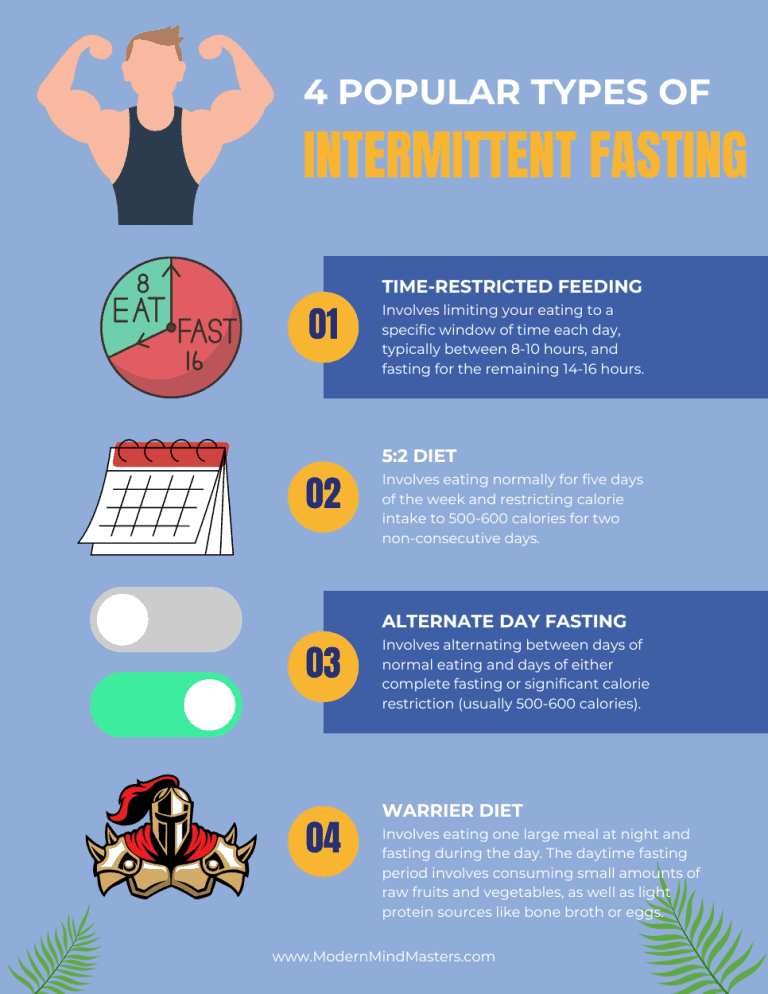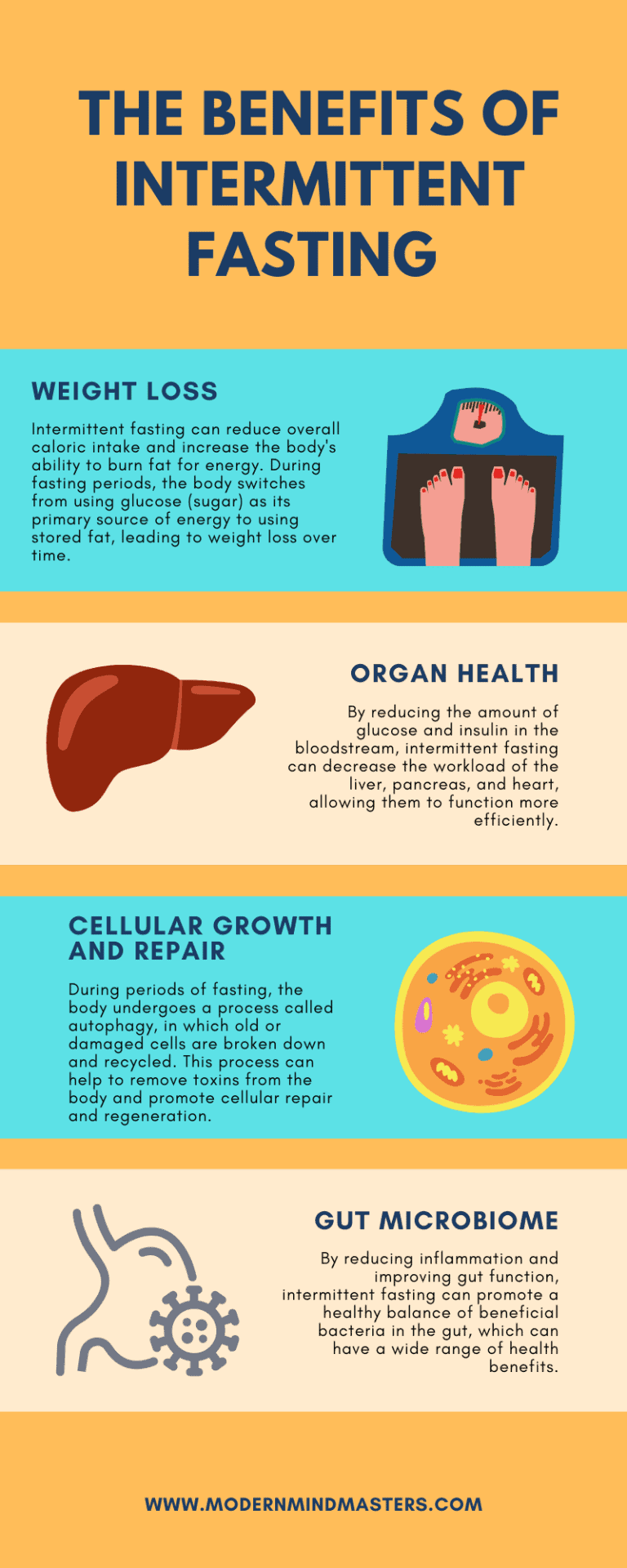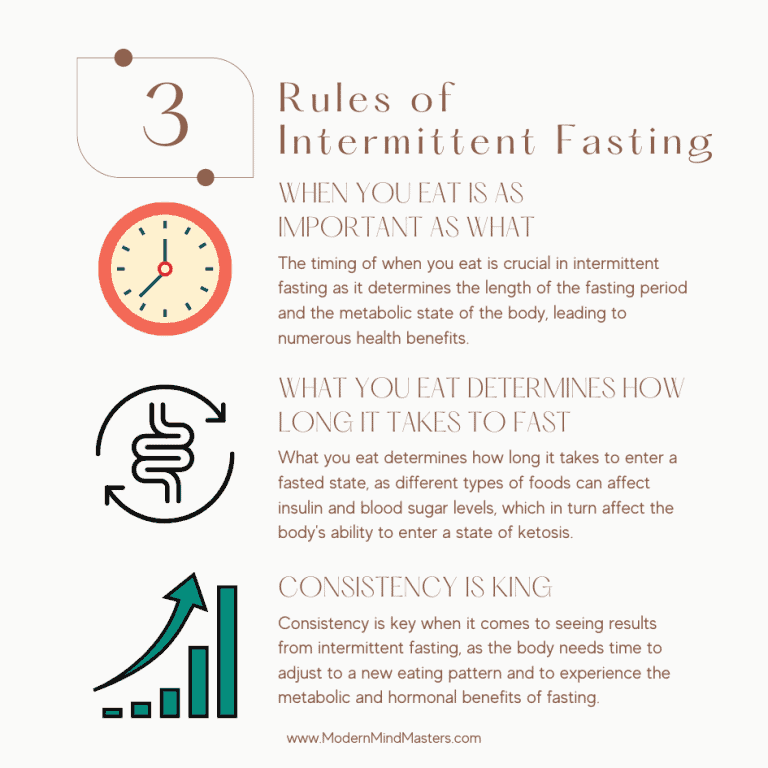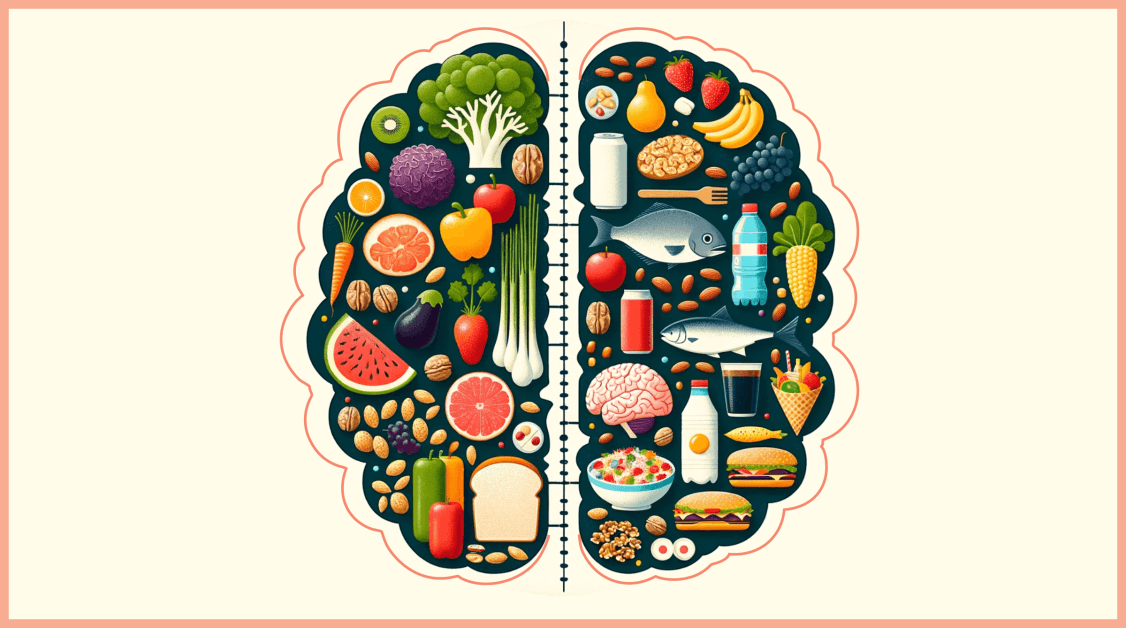The 3 Rules Of Intermittent Fasting For Weight Loss And Health
Key Points:
- Intermittent fasting offers health benefits such as weight loss, improved organ health, cellular repair, and a healthier gut microbiome.
- The key rules for successful intermittent fasting are determining the right eating window, considering the timing and content of your meals, and maintaining consistency in your fasting schedule.
- Consistency is essential; it may take 60 days to see noticeable results from intermittent fasting.

Intermittent fasting, a type of diet where you cycle between periods of fasting and eating, has gained popularity not only for its success with weight loss, but for its many other health benefits, including improved liver health, mood, cognition, and gut health.
This is a welcome relief in a time where social media “gurus” are spouting a lot of disinformation, from the silly to the downright dangerous, in a bid to gain popularity and make a quick buck.
This article aims to steer you away from these distractions and guide you down a path where gradual and consistent application of tried and tested science-based principles of intermittent fasting can improve your physical and mental health.
What is Intermittent Fasting?
Intermittent fasting is a dietary approach that cycles periods of fasting and non-fasting. This is not the same as eating and not-eating, however, due to the biological lag of rising and falling blood glucose levels that follow eating and dictate when our body is in a fasted condition.
Once we stop eating, it may take 2-6 hours to enter a fasted state, depending on many factors, such as what (and how much) you ate.
There are many types of intermittent fasting schedules, some more extreme than others. The most common is time-restricted feeding, where we restrict our eating windows to specific times of the day, such as an 8-hour feeding period starting at 7 am and ending at 5 pm.
While time-restricted feeding is a type of intermittent fasting, not all forms of intermittent fasting involve time-restricted feeding.
Other common fasting patterns include alternate day fasting, where no calories are consumed every other day, and 5:2 fasting, where you eat normally for five days in the week and then restrict calories to a small amount (typically 500-600) for the remaining two days.
Whereas many diets soon turn to fads (even popular ones such as Atkins have little scientific credibility), intermittent fasting is increasing in popularity for two main reasons.
Firstly, the scientific community is finding increasingly rigorous evidence for its benefits beyond weight loss, and secondly, it is easier to commit to, and the results are more reliable.

Benefits of Intermittent Fasting
1) Weight Loss
The theory of weight loss may be simple, but it is certainly not easy. There is a fundamental physiological condition that cannot be cheated or outsmarted – that weight loss (or gain) is determined by calories out (burned) relative to calories in (consumed).
Anyone telling you that you can lose weight while eating however much you want is either trying to sell you something or completely wrong. If you consume more calories than you burn, you will gain weight. Similarly, if you burn more calories than you consume, you will lose weight.
The simple act of restricting your feeding window (such as eight or ten hours) and limiting how often you can eat, leads to people eating less in total. There’s no crazy science here; you are likely to eat less purely because you have less time to eat it.
Intermittent fasting, however, has been shown to affect the latter half of the equation (calories burned) through some rather fascinating biology.
Extended periods of fasting (greater than 60 days) have been shown to induce numerous changes in metabolic processes in the body, which affects the rate at which you can burn calories through ketosis.
This effect is easily offset by overeating, however; a small 400-calorie candy bar takes 30 seconds to eat but about 60 minutes of walking to burn, hence the saying, a moment on the lips, a lifetime on the hips.
Data shows that for those who follow time-restricted feeding over longer periods, biological changes in the body occur that alter the way you metabolize energy, specifically shifting it to utilize energy from fat loss to a higher degree than other sources of energy, such as tissue, muscle, water, and glycogen.
When in a fasted condition, insulin levels decrease, resulting in lipolysis, or the breakdown of fat into usable energy. By increasing lipolysis through intermittent fasting, the body can metabolize greater amounts of energy from fat than from other sources.
Intermittent fasting may help burn a higher proportion of weight from fat than other diets, but it is no magic formula. It requires sacrifice and dedication with both your diet and exercise. Any fat-burning advantage offered by intermittent fasting will easily be offset by overeating, even by just a couple of hundred calories.
2) Organ Health
The benefits of intermittent fasting extend far beyond weight loss.
The study “Time-restricted feeding without reducing caloric intake prevents metabolic diseases in mice fed a high-fat diet” found that mice that ate around the clock quickly developed fatty deposits in the liver, whereas mice restricted to an 8-hour feeding window did not.
Some of the mice reversed their levels of fatty deposits, suggesting that it is possible for intermittent fasting to reduce this effect and improve overall liver health.
Much of this effect is thought to be due to the reduction of inflammatory markers when blood glucose levels are low.
After we eat, blood glucose and insulin levels rise to deal with specific metabolic processes such as digestion and gastric emptying, requiring more energy and increasing the expression of different proteins, genes, and inflammatory markers.
While these inflammatory markers are not inherently bad (they are there to respond to challenges such as digestion and immunity processes), exposure for too long can place a strain on organs such as the liver, in the same way that sunlight is good for our skin, but too much will burn and harm it.
Through intermittent fasting, we reduce the time spent with elevated levels of blood glucose and thus reduce the time our liver and other organs are exposed to inflammatory markers, which have been shown to have detrimental effects on the liver as evidenced by the study on mice.
3) Cellular Repair
Intermittent fasting has also been shown to downregulate a protein kinase called mTOR, an enzyme that plays a critical role in regulating cellular metabolism, growth, and survival in response to nutrient availability, energy status, and growth factors.
When activated, mTOR stimulates protein synthesis by promoting the translation of mRNA into protein while inhibiting autophagy, a process that degrades and recycles cellular components, allowing cells to grow and build new tissues in response to anabolic stimuli.
When we continuously eat without allowing the body to enter a fasted state, the body spends more time building and less time repairing and maintaining cellular health. The body is stuck in an “always on” growth mode, limiting the time it has to clear out and flush away metabolic debris and waste in the body and brain.
By extending time spent fasting, we allow the body to direct energy away from growth and towards cellular repair and maintenance, resulting in reduced inflammation, improved insulin sensitivity, and protection against age-related diseases such as cancer, Alzheimer’s, and cardiovascular diseases.
4) Gut Microbiome
Clock genes, those involved in regulating circadian rhythms, have been shown to impact the mucosal lining of the gut. Intermittent fasting, through strengthening the regularity and entrainment of these clock genes, acts to strengthen the gut microbiome, reducing the impact of digestive issues such as irritable bowel syndrome.
Intermittent fasting has been shown to increase the abundance of beneficial bacteria such as Lactobacillus and Bifidobacterium while reducing the abundance of harmful bacteria such as Firmicutes and Proteobacteria, leading to benefits such as reduced inflammation, an improvement in gut barrier function, and enhanced insulin sensitivity.

What Are The 3 Rules for Successful Intermittent Fasting
Having seen the benefits of intermittent fasting on weight loss, organ health, cellular repair, and the gut microbiome, let’s now focus on the most important fundamental rules for successful intermittent fasting.
1) When You Eat is as Important as What You Eat
The first thing to lock down when starting your intermittent fasting journey is exactly when your time-restricted feeding period should be.
Although there is no straightforward answer, and the time you should fast depends on many factors (an athlete, for example, would not have the same feeding period as a pensioner), the consensus among nutritional research shows that eight hours is a good target for most.
There is nothing set in stone or holy about this number, however; it simply forms the best place to start in terms of health benefits.
What is more important is to find a period that comfortably fits into your lifestyle, including your other important schedules such as family, friends, and work. Obtaining the benefits from intermittent fasting is about consistency, and the only way to achieve this is through comfortably integrating your eating schedule into your daily life and commitments.
My intermittent fasting schedule is ten hours, where I eat my first meal after exercising at 7 am and finish my final meal at 5 pm. I would like to reduce this to eight hours, but I cannot achieve this without sacrificing eating with my wife, which is more important to me than the slight health advantage I might gain from a shorter feeding window.
This might be 12 hours for you, which is perfectly fine if it’s the shortest window you can comfortably manage to make it consistent with your other schedules. Obtaining the benefits from intermittent fasting is a marathon, not a sprint: Consistency is the priority.
Ensure your feeding window falls in the active part of your day, typically in the morning and afternoon; research has shown that eating at night can induce various detrimental health effects. Try to eat more protein in the morning; protein synthesis is maximized earlier in the day.
We all naturally fast when we sleep, so it makes sense to take full advantage of this period by extending our fast on either side of it. Try not eating an hour after waking and three hours before sleeping.
What is vital, however, is to not eat outside this window; even small amounts of food will increase blood glucose and break the fast. A ten-second snack may break your fast for hours, so be strict with your schedule. Start easy with a 12-hour feeding window and gradually reduce it over a few weeks, if possible.
2) What You Eat Determines When You Fast
The biggest mistake made when intermittent fasting is not understanding that fasting does not start when you stop eating.
After eating, your blood glucose levels rise to process the ingested food and return to its baseline level when finished. As a result, there is a biological lag between when you eat and when your body enters a fasted state (usually between two and six hours).
The length of time between eating and fasting depends on many factors, especially what you eat.
In general, simple sugars, including fructose from fruit and sucrose from processed foods, will raise your insulin and blood glucose more than complex carbohydrates.
In fact, insulin sensitivity to sugar is so high that just one gram of sugar consumed post-dinner has been found to increase blood glucose levels.
Protein does not cause as significant an insulin spike as carbohydrates and sugar but can cause a moderate increase in insulin levels when consumed in high quantities.
The lowest insulin-spiking foods include non-starchy vegetables, berries, nuts, seeds, whole grains, and legumes.
What You Can and Can't Consume When Fasting
I wish I could give you a list of foods that will maintain a fasted state, but any food (or drink) containing calories or sugar will cause your blood glucose and insulin levels to rise and reset the process between eating and fasting.
Sugary drinks are the biggest no-no; nothing will spike your insulin more than 40 grams of sugar packed into a small 12oz can.
Diet sodas (those that contain zero sugar and zero calories) do not contain any calories or macronutrients that would break a fast. Some studies, however, have suggested that artificial sweeteners may trigger an insulin response in some people.
Additionally, artificial sweeteners lead some to develop cravings for sweet foods, which could make it more difficult to adhere to a fast. The safest way is to avoid diet drinks altogether, but if you must, they should be ok to maintain a fast.
So what won’t break a fast? Water is safe to drink, and also a requirement (water fasting is an increasingly popular form of fasting); food contains much of our daily water requirements, so when we fast for extended periods, we are more likely to suffer from dehydration.
Similarly, tea and coffee, when taken without milk or sugar, are fine to drink while fasting.
When feeling hungry, weak, or shaky, as can happen when fasting, half a teaspoon of salt dissolved in water can help to eliminate these feelings.
Salt, or more specifically sodium, has a stabilizing effect on blood by regulating blood volume and pressure. When you feel weak and shaky during a fast, you may think you need food and sugar, but what you actually may need is a little salt to rebalance your electrolytes.
Lemon and lime juice (in low quantities) acts as a glucose disposal agent and contains compounds called flavonoids, which have been shown in some studies to have hypoglycemic effects.
For example, a study published in the Journal of Agricultural and Food Chemistry found that the flavonoids in lemon peel helped to reduce blood glucose levels in diabetic rats.
Try a fasting cocktail of water mixed with lemon juice and a small amount of salt during your fasting periods. Not only will this ensure you remain sufficiently hydrated, but the salt will also help to stabilize your blood pressure, avoiding any detrimental effects from low levels of electrolytes.
3) Consistency is King
As with all worthwhile endeavors, from starting a business to learning a new language, consistency is the fundamental driver of success. You can have all the talent and knowledge in the world, but if you don’t consistently apply it, failure is almost inevitable.
Keep Your Schedule Constant
Your body is at its healthiest and most efficient when its clock genes are entrained (aligned). By keeping your fasting period as constant as possible, your body can better maximize the benefits offered by intermittent fasting.
Whether you’ve settled on an 8, 10, or 12-hour feeding window, stick to it every day, including weekends. Try to keep your start and finish times consistent; many change their schedule on the weekend when they don’t have to wake up for work. Delaying by an hour or two is likely fine (say 7 am Mon-Fri and 8 am on the weekends), but certainly avoid large transitions of 3 hours or more.
Inevitably, some days and activities, such as social events, will render this schedule impossible. One or two missed days here and there are not going to hurt, and we certainly shouldn’t sacrifice our social lives for such things. You cannot let any diet dictate your life; you have to make it work for you.
60-Day Minimum for Results
Weight loss is a slow process, and you need to give intermittent fasting at least 60 days (2 months) before the effects on weight and general health become noticeable.
Weight loss is a marathon, not a sprint. Start easy (perhaps a 12-hour feeding window), and reduce as much as you comfortably can over time. If you cut down to 10 and find yourself breaching your times often, then go back up to a point where you can become consistent. It is far better to stick to 12 hours consistently than it is to stick to 8 or 10 and fail often.

Conclusion
Intermittent fasting (otherwise known as time-restricted feeding) is a dietary approach that cycles periods of fasting and non-fasting and is increasing in popularity due to its proven benefits beyond weight loss, such as cellular repair and organ health.
It is important to note that while intermittent fasting may help burn a higher proportion of weight from fat than other diets, it requires sacrifice and dedication to both diet and exercise. There is no way to cheat the fundamentals of calories in versus calories out, but we can use it to maximize how many calories we burn.
So give your body the attention and maintenance it deserves and give intermittent fasting a try. A little change can go a long way.

The Unconscious Mind – What is the Unconscious?
The unconscious mind has long been shrouded in mystery, but psychology and neuroscience are making great progress to reveal the science behind non-conscious mental processes

The Science of Stress – Causes, Symptoms, and Treatment.
Discover the science of stress – causes, symptoms, and treatment – and learn to embrace stress as a natural part of life while developing tools to navigate it effectively.

How Psychedelics Can Help Treat Mental Health
Research on psychedelics has shown a whole host of possible therapeutic benefits for treating mental health, including depression, PTSD and addiction.

Mastering Emotions: The Science Behind Emotional Control
To master emotions, and improve emotional control, we first need to understand the science behind them.

How to Stop Oversleeping – A 7-Step Guide
Follow these 7 simple steps that work alongside your body to learn how to stop oversleeping.

Food as Medicine: A Nutritional Perspective on Treating Anxiety
Explore how diet, from omega-3s to ketogenic diets, impacts anxiety, offering a holistic approach to mental health through nutritional psychiatry.